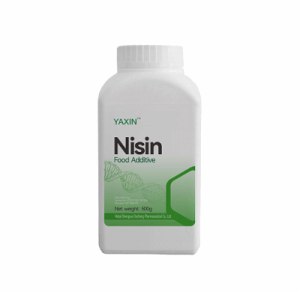
 CONTACT
CONTACT
- Linkman:Linda Yao
- Tel: +8618231198596
- Email:linda.yao@dcpharma.cn
- Linkman:CHARLES.WANG
- Department:Overseas
- Tel: 0086 0311-85537378 0086 0311-85539701
Long-term Supply of Nisin,Market Quote
TIME:2024-08-26
The high temperatures encountered during processing can have some impact on the effectiveness of nisin, but this impact is not entirely negative and can be minimized through appropriate process controls.
1. Heat Resistance of Nisin: Nisin can withstand high-temperature treatments (e.g., 121°C for 15 minutes) under acidic conditions (e.g., pH 3.0), indicating that it has some degree of heat resistance. However, as the pH increases, its stability significantly decreases. Therefore, during processing, if the food system's pH is relatively high, the heat resistance of nisin may be affected, leading to reduced activity or inactivation.
2. Impact of High Temperature on Nisin Activity: Although nisin can tolerate a certain level of high-temperature treatment under acidic conditions, excessively high temperatures or prolonged heating may still reduce its activity. This is because high temperatures can accelerate chemical reactions, including those that may damage its molecular structure. However, in processes like canning, the temperatures and times used are usually carefully designed to ensure that microorganisms are killed while preserving as much of nisin's activity as possible.
3. Influence of Process Controls on Nisin Effectiveness: To maximize nisin's effectiveness during processing, the following process control measures can be taken:
·Control pH levels: Maintain an acidic environment in the food system during processing to improve nisin's stability.
·Optimize heating conditions: Select appropriate heating temperatures and times based on nisin's heat resistance, avoiding excessively high temperatures or prolonged heating.
·Use microencapsulation technology: Encapsulating nisin in microcapsules can help protect it from adverse factors such as high temperatures. This technology has been applied in high-temperature baked goods with good results.
4. Practical Application of Nisin in High-Temperature Processing: In practical applications, nisin has been widely used in various foods requiring high-temperature processing, such as canned foods and meat products. Through reasonable process design and control, nisin can effectively extend the shelf life of these foods while maintaining their quality.
High temperatures during processing can impact nisin's effectiveness, but this impact can be minimized by controlling pH levels, optimizing heating conditions, and using microencapsulation technology. Under appropriate processing conditions, nisin can still exert its strong antibacterial effect, providing the food industry with a safe and effective preservative solution.
- Tel:+8618231198596
- Whatsapp:18231198596
- Chat With Skype







